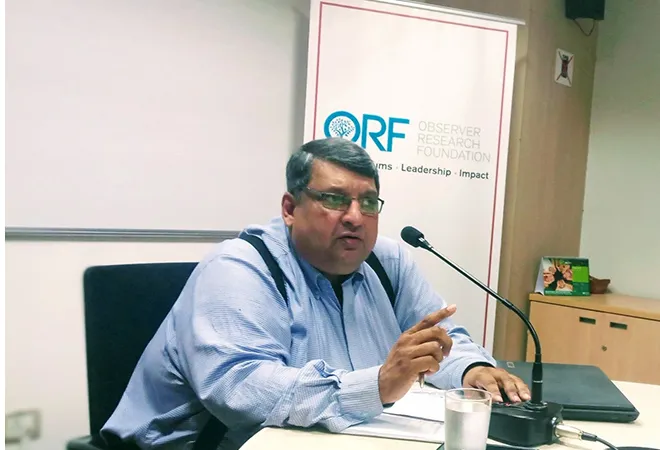"In order for trade agreements to work, our economic intelligence needs to be strengthened,” said Somi Hazari, International Trade Consultant, while speaking on ‘Preferential Trade Agreements: Past, Present & the Future’ at Observer Research Foundation, Chennai, on 25 January 2020.
“We in India need to do far more homework on our trading partners and be clear about our concerns; and where there are serious concerns, we should be ready with alternatives,” Hazari said. According to him, on these fronts, India was lagging behind other trade blocs such as EU, North America and ASEAN.
Hazari, a Chennai-based trade consultant, regretted that in India certain basic questions remain unevaluated, such as “What is our long-term view of trade? What is the optimum we can give or take? Where do we wish to go from here? A long- term view on the kind of trading relationships we wish to develop as well as a clear idea of the kind of trading partner we want to be are missing in India.”
According to Hazari, there needs to be a paradigm shift in India regarding trade and a better understanding of its contribution to India’s economic growth. “Trade is both exports and imports. This argument that we should restrict our imports and only grow our exports still very much exists in India. This notion needs to be reconsidered. Duties on imports at times bring far better income,” he explained.
Non-tariff barriers
Looking at the past, Hazari talked about India’s first Free Trade Agreement (FTA) which was signed with Sri Lanka. Though in principle this means that both countries have preferential access to each other’s markets, in reality trade has been hampered by non-tariff barriers (NTB). “Non-Tariff Barriers (NTBs) enter the picture and undo the progress made by FTAs. Domestic lobby groups are mainly responsible for these, as they don’t want the competition,” he explained.
“Any agreement, trade or otherwise is signed in good faith. Once all parties have reached an agreement that is acceptable to everyone and it has been signed, it should be honoured. NTBs undermine the entire process,” critiqued Hazari.
Hazari shared an anecdote involving import of chicken sausages from Sri Lanka to demonstrate the role of NTBs in undermining intra-regional trade. “Sri Lankan sausages sell better in the Indian market simply because they make better sausages on account of better machinery” he observed. When a consignment arrived in Chennai, the importers were told they needed a special import license from Delhi. When they got to Delhi, they learnt that these licenses are issued by the committee of agriculture, which sits only once every 45 days. “For a trader, time is your biggest enemy, particularly when dealing with perishable goods. While one is waiting for these formalities to be cleared, shipping companies are making money through demurrage charges,” he lamented.
RCEP: More homework needed
When asked about India’s decision to stay out of RCEP, Hazari said India had genuine concerns. “The fear of Chinese goods flooding the market is a very real fear as it is already happening,” he said. Several nations that signed on to RCEP felt that India’s rules of origin criteria were too strict. However, Hazari felt that India had suffered because of the misuse of India-Sri Lanka FTA.
He quoted the example of copper being imported from the CIS countries which normally carries an import duty of 80%. Following the India-Sri Lanka FTA, copper imports were being re-routed through Sri Lanka at a 3% rate of duty. “Though this particular case was identified and stopped within six months, this is only one example,” said Hazari.
Arecanut farmers in India were concerned about its inclusion in RCEP as they feared large-scale increases in imports from Indonesia, Myanmar, Thailand and Malaysia. However, several agro-economists have argued that the impact of RCEP was unlikely to be negative as it is already being imported from these countries through informal trade. Hazari said, “when it comes to these FTAs, India needs to do far more homework.” Unfortunately, a widely-held complaint against India is that it pitches its concerns at the very last minute without providing alternatives, Hazari felt.
Time is right for UK pact
Looking at future agreements, Hazari said the EU-India FTA was unlikely to be concluded any time soon, as India had apprehensions that it was (in its current form) one-sided and harmful to Indian interests. He said “this was not just a case of India being strict and unrelenting, but certain requirements on the EU side were unreasonable as well, such as their insistence on de-husked coconuts and specific production methods for mangoes to ensure they are organic.”
He said there are many details to be worked out before either country is ready to sign an agreement. In contrast, Hazari felt the time was right for a new trade agreement with the UK. In their post-Brexit trade campaign, India is on the UK government’s target list of countries. Giving this, India’s focus should be on the UK, he argued.
In conclusion, Hazari recommended that India needs more long-term strategic thinking and transparent trade policies. This will be greatly aided by in-depth studies on India’s trading partners as well as better trained Customs personnel who have up-to-date knowledge of the laws and regulations.
This report was prepared by Dr. Vinitha Revi, Independent Researcher, Chennai
The views expressed above belong to the author(s). ORF research and analyses now available on Telegram! Click here to access our curated content — blogs, longforms and interviews.
